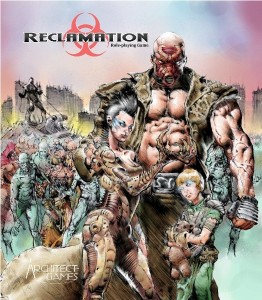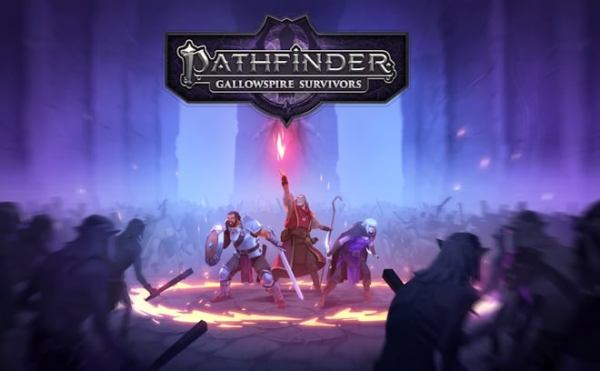Reclamation
Reclamation is a sci-fi fantasy post-apocalyptic role-playing game written by Chris Griesinger and published by Architect Games.
By Aaron T. Huss

Learn more about Reclamation here
Purchase Reclamation here
Reclamation is a sci-fi fantasy post-apocalyptic setting and system powered by a standard deck of playing cards instead of dice. The setting takes place in a post-apocalyptic Earth after a pandemic swept across the world (caused by a Nuclear Cataclysm) and transformed half of the human race to bloodthirsty degenerates. The player characters assume the role of survivors touched in some way by the apocalyptic event (depending upon their age). Reclamation takes place shortly after the apocalyptic event so the setting is filled with those who survived the apocalypse, those who were born after it, and those who are considered the current youth population.
As mentioned, Reclamation utilizes a standard playing deck of cards instead of dice for resolution. Players flip over the top card from their Fate Deck, adding your ability, and attempting to meet or exceed the target number. Skills are used as a way of improving your odds by allowing additional cards to be flipped and hoping for a better result. Without spoiling the mechanics, some cards add to your total while others subtract. This is how you end up with the randomness like a die roll. Target Numbers vary depending on the action being taken, but they are essentially a measure of how well or poorly the action was instead of a simple pass or fail.
CONTENT
Reclamation is broken down into 8 chapters (not including the narrative before and after). While in-game content is covered in these sections, there’s definite material to farm from the narratives.
Introduction covers the basic introduction to the game such as the standard what is a roleplaying game along with introducing who everyone is (Game Masters are called Fate Dealers). This is all very standard and includes some sample play.
Making a Dystopian Hero is your guide to the very basics of creating a character. This chapter walks you through the process of creating a character and is essentially a detailed explanation of the character sheet, how to calculate everything, and what they mean. This is essentially meant as a guide to deciding what type of character you’d like to create while the gritty details to that creation are found elsewhere.
How to Play does exactly what it says. It is the guts of Reclamation’s mechanics with an extensive look at using the Fate Deck.
Combat tells you all about the mechanics that govern combat. As with the base mechanics, these are card based and use an interesting mechanic for determining damage. Combat is fairly fluid in that each participant is considered, like an opposed die roll, during each person’s attack. Each attack is resolved as a pair of attacks and reactions instead of simply gauging one’s attack against the others defensive rating.
Gathering Possessions is all about gear including armor, weapons, mundane items, carrying load, and other methods of inflicting damage.
Facing the Fallout expands upon some of what was learned during character creation. Here you learn more about radiation and your character’s fallout rank. Here you also learn about the effects the setting has on the character’s spirit and Sickness (think psychosis). Reclamation is a dark setting and these are some of the mechanics that embrace that theme.
Gifts of the Fallout talks all about magic (called Gifts). These are the paths characters take that provide supernatural abilities akin to fantasy magic.
The Making of a Journey is the only section dedicated to the Fate Dealer, so player’s should stay away from this one. It goes into the nuts and bolts of making adventures along with providing adversaries and a sample adventure. Most of this (outside of enemies and the adventure) is written very generically with references back to the Reclamation setting. This helps to give the Fate Dealer a familiar path by using their previous experience to construct new adventures.
OVERALL
Reclamation is a truly unique setting and system, taking a very dark approach to sci-fi fantasy post-apocalyptic instead of the humoristic settings you find elsewhere. The apocalypse truly transformed the world for the worse and even the darkness of the layout accentuates that image. The use of the playing card mechanics provides a truly unique experience giving gamers something they may have never seen before. At the very least, if one doesn’t like using cards over dice, you can change the system to a dice pool or use it as a campaign setting. Either way, your bound to get a lot of enjoyment out of Reclamation no matter how you use it.
RATINGS
Publication Quality: 8 out of 10
Reclamation is a beautiful book, supported by the successful Kickstarter campaign. It has great looking art, an easy-to-read layout, and the formatting looks nice. I would say that there is actually too much art at times. I found plenty of locations where the art did not really add to the value of what was being stated in the content. I also found the continued insertion of narrative to be excessive. A little narrative sprinkled throughout is nice, but when it really breaks the flow of the content, it becomes intrusive instead of valuable or fun. (You could say it was slightly over-produced.) However, visually, Reclamation is a great book and the layout and formatting make the mechanics easy to understand.
Mechanics: 8 out of 10
The playing card mechanics for resolving actions is incredibly unique and put together in a way that makes them interesting and fun. The character creation is a great way of building a great character and how the skills allow you additional cards to improve your chances of success is a great implementation of characters; this method really brings the action resolution mechanics and character creation together. Magic is a bit on the heavy side in terms of volume of mechanics. Almost half of the book is given over to magic (Gifts) which seems a bit much for a post-apocalyptic setting that seems to focus on sci-fi as much as it does on fantasy. Additionally, there is not nearly as much information for the Game Master (called the Fate Dealer) in terms of antagonists and Reclamation adventure creation (there’s a lot of generic stuff, but not so much setting content). The example adventure does a good job of painting the scene for the Fate Dealer, but I think a little more love for the person running the game could be included.
Combat has a very different feel for mechanics compared to simple action resolution. While the cards are still involved, there is a bit more decision making required on each participants part (by choosing how much aggressive one is attacking) and damage is static using the given options on each weapon (related to the cards suit). This is a very unique way of using the playing cards and again plays in quite well with the card-based mechanics of the system overall.
Desire to Play: 10 out of 10
Reclamation is a very unique setting and a very original system. If you refuse to play with anything other than dice, then I suggest using the setting for a campaign in another system. However, if you are ready to try something different, Reclamation has lots of great characteristics that make it desirable for play, even campaign play.
Overall: 9 out of 10
There are plenty of sci-fi fantasy post-apocalyptic settings and systems available. Many of them take a very epic fantasy approach to this version of post-apocalyptic and many add a bit of humor into the supposed dismal setting. However, many of these settings are wastelands that feel like survival is not as hard as it claims. Reclamation doesn’t have that feel. Reclamation puts the apocalypse back into post-apocalyptic by presenting a very dystopian and dark version of Earth after the apocalyptic event. You won’t spend your time wondering what the alarm clock you just found does (because you don’t know it’s an alarm clock), rather you’ll spend a lot of time fighting for your lives and actually struggling to survive in a world that has been drastically changed.

